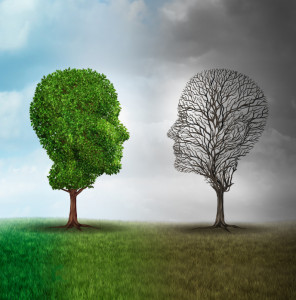 Bipolar is a condition which a person’s mood can cycle from overly positive and active (up, also called mania) to very depressed and inactive (down). People will have periods of stable mood in between these states. Everybody who is diagnosed with Bipolar experiences it slightly differently, but generally there are similarities in symptoms. It is important to know that Bipolar can be managed well with the right combination of strategies, usually a mixture of the right medication for you and therapy.
Bipolar is a condition which a person’s mood can cycle from overly positive and active (up, also called mania) to very depressed and inactive (down). People will have periods of stable mood in between these states. Everybody who is diagnosed with Bipolar experiences it slightly differently, but generally there are similarities in symptoms. It is important to know that Bipolar can be managed well with the right combination of strategies, usually a mixture of the right medication for you and therapy.
What Causes Bipolar?
Unfortunately at this point in time the exact cause of Bipolar is not know, however, there is thought that genetic and biochemical factors combined with stressful life events may all play a significant role. If someone in the family/whānau has relatives with Bipolar, they may have an increased chance of developing it.
Early trauma (e.g. grief, physical, emotional, sexual abuse, neglect etc), physical illness, lack of sleep, misuse of drugs/alcohol, substances and medications may also be risk factors for the onset of first and subsequent episodes.
When does it start?
Bipolar often starts in a person’s late teens or early adult years, but adults in later life can also develop Bipolar.
The diagnosis in children is currently controversial. Up to 2% of the adult population are diagnosed and around 5% of people may experience milder, but noticeable mood fluctuations.
Episodes of mania and depression typically recur across the life span. Between episodes, many people with Bipolar are free of symptoms, with others having some ongoing symptoms.
Signs of Bipolar
Everybody experiences mood shifts in daily life, but with Bipolar these changes can be more pronounced. Often, people with Bipolar will seek help during ‘down’ periods as they feel bad, but when they are ‘up’ they feel fantastic. They may not be aware they are acting in ways that concern others- typically it is family members and others who know you well who are concerned during periods of mania.
Depressive Episodes
Symptoms may include:
- Low or depressed mood
- A sense of hopelessness
- Lack of energy
- Feelings of guilt or worthlessness
- Inability to concentrate
- Loss of interest in, or enjoyment of usual activities
- Sleep disturbances
- Wanting to escape one’s mind
- Suicidal thoughts and behaviours*
- Eating problems
*Suicidal thoughts and specific plans for suicide must always be taken seriously by others.
Manic Episodes
Symptoms may include:
- Elevated or ‘high’ mood
- Restlessness
- Extreme irritability
- Talking very fast
- Poor judgement
- Racing thoughts and ideas
- Unable to sleep
- Feeling very important
- Risky behaviour (e.g. overuse of drugs/alcohol, spending money, aggressive or overly sexualised behaviour)
- Doing things very fast and often (e.g. excessive cleaning, exercise)
It is not uncommon for the person experiencing a manic episode to be unaware of the changes of their attitude and behaviour. After a manic phase is over, they may be shocked at what they have done and the effect it has had on them and/or others.
Where to Get Help?
A GP is the best person to talk with first. Find a GP that you feel comfortable and confident with, tell them what is going on for you and how it is affecting your life. If necessary, they may refer you on to a mental health professional who may complete an assessment and discuss various options of treatment.
Common Treatment Options:
Medication
Everybody is different, so different medication types, doses and combinations may suit different people.
Some people may not fully respond to medication or simply find medication difficult to tolerate. It is helpful/important for people to take the medication as prescribed, and to feedback to their GP any symptoms or side effects they are experiencing so adjustments can be made. Due to this it may take a while to find the right medication that suits you, and that may change overtime.
Talking Therapy
Talking therapies such as psychotherapy, DBT (Dialectical Behavioural Therapy) or CBT (Cognitive Behavioural Therapy) can be an important part of treatment of Bipolar.
A good therapist who you feel you can trust can help you to cope with feelings and symptoms, and change behaviour patterns that may contribute to your mood changes.
Talking therapy is not just ‘talking about your problems’, effective therapies that help Bipolar typically involve using tools to get balance into your thinking and feel states, and may also involve working towards gaining insight and acceptance.
If You Are In Crisis
If you are in extreme distress and need immediate help, you or your family can call the crisis mental health services or call an ambulance. Each District Health Board (DHB) will have a local or 0800 number for you to call.
The number of your local crisis team can be found on the link below:
The information provided for this post has been provided by the Mental Health Foundation of New Zealand – Mauri tū, Mauri ora. www.mentalhealth.org.nz